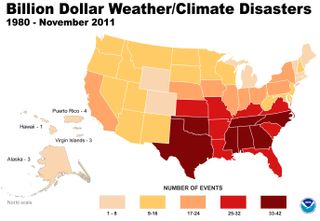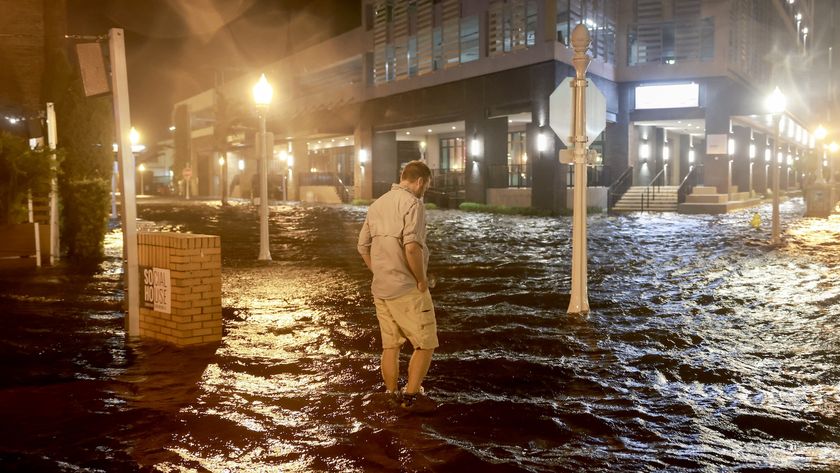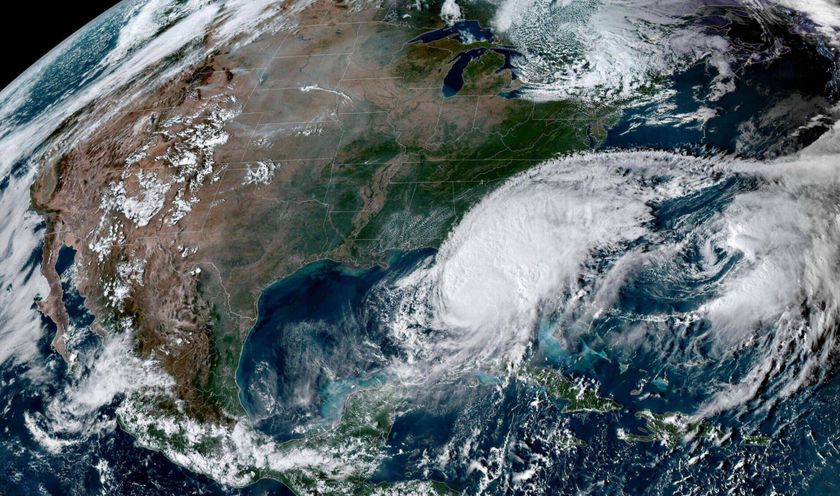
2011 Tally of Billion-Dollar Weather Disasters Hits 12

The damage toll from this year's wild weather keeps growing. A June tornado outbreak and the wildfires that have plagued the Southwest were added to the year's list of U.S. billion-dollar weather disasters, bumping the 2011 total to a record 12, according to the National Oceanic and Atmospheric Administration (NOAA).
Earlier this year, Hurricane Irene had already put 2011 in first place by becoming the tenth billion-dollar weather disaster of the year, passing the $9-billion weather disasters of 2008.
These costly disasters don't hit the country evenly. Since 1980, wild weather has been costliest in the South. Texas, Oklahoma, Georgia, Alabama, Mississippi, Tennessee and North Carolina have had 33-to-42 billion-dollar weather disasters, according to NOAA.

Some eye-popping numbers about this year's wicked weather:
· 3-million residents lost power during an unseasonably early nor'easter storm Oct. 29-31.
· 343 tornadoes struck between Alabama and Virginia in late April, the largest outbreak on record.
· 199 tornadoes struck the Southeast on April 27, a record for a single day.
Sign up for the Live Science daily newsletter now
Get the world’s most fascinating discoveries delivered straight to your inbox.
· 1-million acres in Texas were burned during this year's record wildfire season.
· 19 tropical storms formed in the Atlantic this year, the third-busiest season on record.
· $3-billion will be needed to rebuild after a tornado struck Joplin, Mo., May 22, the single-costliest tornado in U.S. history.
· 300-percent-more precipitation than normal fell in the Ohio Valley, triggering historic flooding along the Mississippi River.
Here are the 12 U.S. billion-dollar disasters of 2011, which so far have combined to cause $200 billion in damage:
Texas, New Mexico, Arizona Wildfires, spring- fall:Continued drought and periods of extreme heat provided conditions favorable for a series of historic wildfires across the three states. The Bastrop Fire in Texas was the most-destructive fire in Texas history, destroying more than 1,500 homes. The Wallow Fire consumed over 500,000 acres in Arizona, making it the largest on record in Arizona. The Las Conchas Fire in New Mexico was also the state’s largest wildfire on record, scorching over 150,000 acres while threatening the Los Alamos National Laboratory. Over 3-million acres have burned across Texas this wildfire season. Total damage in Texas alone due to loss of property, timber and agriculture exceeds $750 million. Losses for wildfire activity across all three states exceeds $1 billion.
Midwest/Southeast Tornadoes and Severe Weather, June 18-22: An estimated 81 tornadoes struck across Oklahoma, Texas, Kansas, Nebraska, Missouri, Iowa and Illinois. Additional wind and hail damage occurred across Tennessee, Georgia, North Carolina and South Carolina. The storms caused over $1 billion in insured losses and total losses greater than $1.3 billion.
Hurricane Irene, August 20-29: Irene first struck the United States as a Category 1 hurricane in eastern North Carolina, then moved northward along the Mid-Atlantic Coast. Wind damage in coastal North Carolina, Virginia and Maryland was moderate, with considerable damage resulting from falling trees and power lines. Irene made its final landfall as a tropical storm in the New York City area and dropped torrential rainfall in the Northeast that caused widespread flooding. More than 7 million homes and businesses lost power during the storm, and Irene caused at least 45 deaths and more than $7.3 billion in damages. [In Photos: Hurricane Irene]
Upper-Midwest flooding, summer: Melting of an above-average snowpack across the northern Rocky Mountains, combined with above-average precipitation, caused the Missouri and Souris rivers to swell beyond their banks across the Upper Midwest. An estimated 11,000 people were forced to evacuate Minot, N.D., due to the record-high level of the Souris River. Numerous levees were breached along the Missouri River, flooding thousands of acres of farmland. The flooding, which is ongoing, has caused more than $2 billion in damages.
Mississippi River flooding, spring-summer: Persistent rainfall nearly tripled the normal precipitation amounts in the Ohio Valley, and, combined with melting snowpack, caused historical flooding along the Mississippi River and its tributaries. The region suffered $2-billion-to-$4-billion in losses. [Mightiest Floods of the Mississippi River]
Southern Plains/Southwest drought, heat wave and wildfires, spring-summer: Drought, heat waves and wildfires scorched through Texas, Oklahoma, New Mexico, Arizona, southern Kansas, western Arkansas and Louisiana this year. In Texas and Oklahoma, respectively, 75 percent and 63 percent of range and pasture conditions were classified as "very poor" as of mid-August. Wildfire-fighting costs for the region are about $1 million per day. Well over $5 billion in damage has occurred so far, with over-2,000 homes and structures lost.
Midwest/Southeast tornadoes, May 22-27: Central and southern states saw approximately 180 twisters and 177 deaths within a week. A tornado rated EF-5 on the tornado-damage scale struck Joplin, Mo., resulting in at least 141 deaths, making it the deadliest single tornado to strike the United States since modern tornado record keeping began in 1950. The total losses were greater than $7 billion.
Southeast/Ohio Valley/Midwest tornadoes, April 25-30: This outbreak of tornadoes over central and southern states led to 327 deaths. Of those fatalities, 240 occurred in Alabama. The deadliest of the estimated 305 tornadoes in the outbreak was an EF-5 that hit northern Alabama, killing 78 people. Several major metropolitan areas were directly affected by strong tornadoes, including Tuscaloosa, Birmingham and Huntsville, in Alabama, and Chattanooga, Tenn. Total losses exceeded $9 billion.
Midwest/Southeast tornadoes, April 14-16: An outbreak over central and southern states produced an estimated 160 tornadoes. Despite the large overall number of tornadoes, few were classified as intense, with just 14 EF-3, and no EF-4 or EF-5, tornadoes identified. Total losses were greater than $2 billion. Thirty-eight people died, 22 of them in North Carolina.
Southeast/Midwest tornadoes, April 8-11: An outbreak of tornadoes over central and southern states saw an estimated 59 tornadoes. Total losses were greater than $2.2 billion.
Midwest/Southeast tornadoes, April 4-5: An outbreak of tornadoes over central and southern states saw an estimated 46 tornadoes. Total losses were greater than $2.3 billion. Nine people died.
Groundhog Day blizzard, Jan. 29-Feb. 3: A large winter storm hit many central, eastern and northeastern states. Chicago was brought to a virtual standstill when 1-to-2 feet (0.3-to-0.6 meters) of snow fell across the city. Total losses were greater than $2 billion. The snowstorm killed 36 people.
- The World's Weirdest Weather
- Ranked: The Worst Snowstorms in U.S. History
- The Top 5 Deadliest Tornado Years in U.S. History
Follow OurAmazingPlanet for the latest in Earth science and exploration news on Twitter @OAPlanet and on Facebook.












